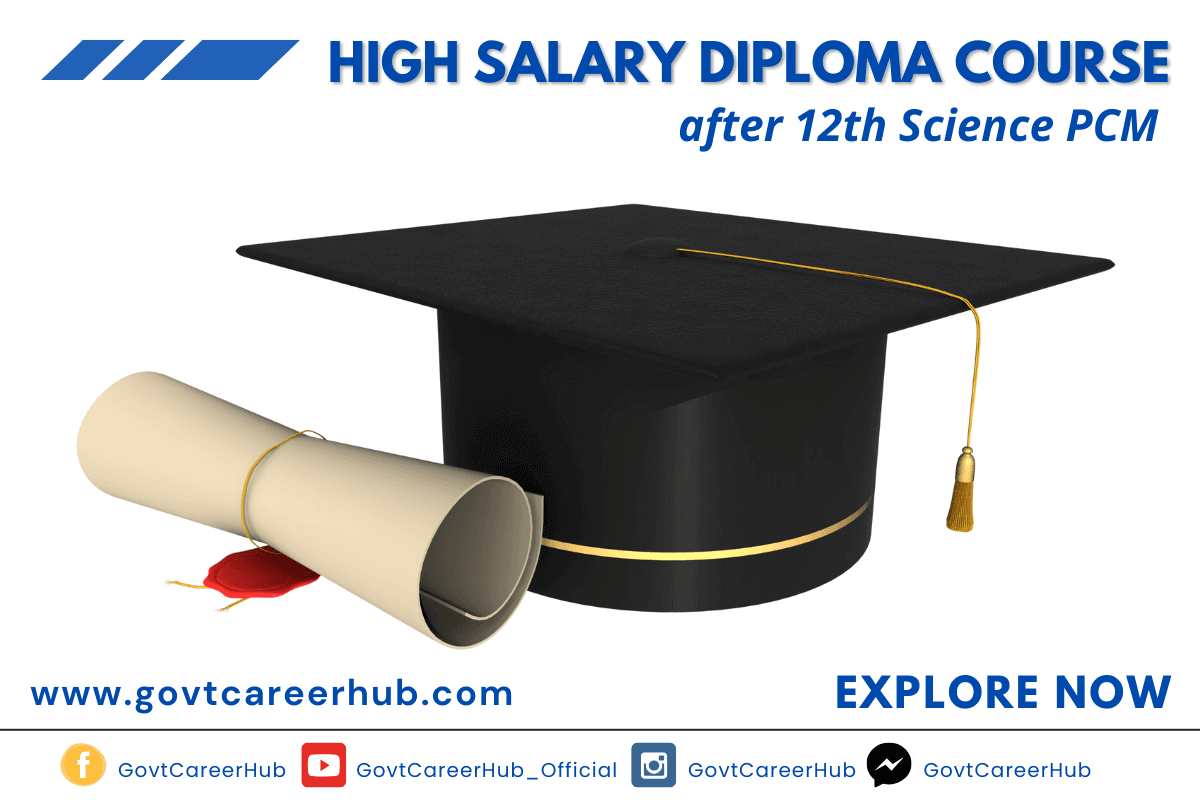Last Updated: July 17, 2025 at 10:45 pm
Discover the top 15 diploma courses after 12th PCM in 2025, including details on duration, eligibility, top colleges, career prospects, and salary expectations. Government-approved programs to kickstart your technical career!
Just completed 12th PCM and feeling overwhelmed about what’s next? With engineering admissions becoming increasingly competitive and four-year degrees requiring significant time and financial investment, many students are turning to diploma courses as a smarter alternative.
Diploma programs offer the perfect balance of practical training, quick employment, and career growth potential — all within a shorter timeframe and at a fraction of the cost of full degrees.
In this comprehensive guide, we’ll explore the top 15 diploma options for PCM students in 2025, complete with details on duration, eligibility, career opportunities, salary potential, and the best institutes to consider. Whether you’re interested in emerging technologies like AI and robotics or traditional engineering fields, this guide has you covered!
Why Choose a Diploma After 12th PCM?
Before diving into specific courses, let’s understand why diplomas are becoming increasingly popular among PCM students:
- Quicker Entry to Job Market: Most diplomas are 3 years compared to 4 years for engineering degrees
- Practical, Hands-on Training: Focus on industry-relevant skills rather than theoretical concepts
- Cost-Effective Education: Lower tuition fees compared to full-fledged degree programs
- Lateral Entry Option: Many diploma holders can enter directly into the second year of B.Tech/B.E. through LEET exams
- Government Support: Programs backed by AICTE, NSDC, and PMKVY ensure quality education and recognition
- Rising Industry Demand: Growing need for skilled technicians and diploma holders across sectors
A diploma isn’t a compromise—it’s a strategic career move that can help you start earning while your peers are still studying!
Top Diploma Courses After 12th PCM in 2025
1. Diploma in Computer Engineering
Duration: 3 years
Eligibility: 12th PCM with minimum 50% aggregate
Fees: ₹40,000–₹2 lakh per year
Key Subjects Covered:
- Programming languages (C, C++, Java)
- Database management systems
- Computer networks
- Operating systems
- Web development
- Software engineering
Career Opportunities:
- Software Developer
- Web Developer
- Database Administrator
- System Analyst
- IT Support Specialist
Average Starting Salary: ₹3.0–4.5 lakh per annum
Top Institutes:
- Government Polytechnic, Delhi
- Delhi Polytechnic
- College of Engineering, Pune
- Government Polytechnic, Mumbai
Industry Outlook: With digital transformation accelerating across all sectors, computer engineering diploma holders are in constant demand, particularly in IT services, banking, e-commerce, and product companies.
2. Diploma in Electronics & Communication Engineering
Duration: 3 years
Eligibility: 12th PCM (usually 50% aggregate)
Fees: ₹30,000–₹1.5 lakh per year
Key Subjects Covered:
- Electronic devices and circuits
- Communication systems
- Digital electronics
- Microprocessors and microcontrollers
- Signal processing
- PCB design
Career Opportunities:
- Electronics Technician
- Communication Equipment Technician
- Technical Support Specialist
- Circuit Designer
- Telecom Engineer
Average Starting Salary: ₹2.5–4.0 lakh per annum
Top Institutes:
- Sardar Vallabhbhai Polytechnic
- Government Polytechnic institutes across states
- Regional Polytechnics
Industry Outlook: The telecommunications and consumer electronics industries continue to grow, with particular demand in mobile technologies, IoT devices, and smart home systems.
3. Diploma in Mechanical Engineering
Duration: 3 years
Eligibility: 12th PCM (with emphasis on Maths)
Fees: ₹30,000–₹1.5 lakh per year
Key Subjects Covered:
- Engineering mechanics
- Thermodynamics
- Machine design
- Manufacturing processes
- Fluid mechanics
- CAD/CAM
Career Opportunities:
- Mechanical Technician
- Design Engineer
- Production Engineer
- Maintenance Engineer
- Quality Control Inspector
Average Starting Salary: ₹2.5–3.5 lakh per annum
Top Institutes:
- Government Polytechnic Institutes in Mumbai, Chennai
- State board accredited mechanical engineering polytechnics
Industry Outlook: Manufacturing sector revival and the push for “Make in India” ensure steady demand for mechanical diploma holders, with emerging opportunities in automation and smart manufacturing.
4. Diploma in Civil Engineering
Duration: 3 years
Eligibility: 12th PCM (minimum marks vary)
Fees: ₹30,000–₹1.5 lakh per year
Key Subjects Covered:
- Structural engineering
- Building materials and construction
- Surveying
- Hydraulics and water resources
- Transportation engineering
- Environmental engineering
Career Opportunities:
- Site Engineer
- Structural Designer
- Quality Control Engineer
- Surveyor
- Project Manager (with experience)
Average Starting Salary: ₹2.5–4.5 lakh per annum
Top Institutes:
- Regional Polytechnics
- Government Polytechnic College
- State board accredited institutions
Industry Outlook: Infrastructure development, including smart cities, highways, and urban renewal projects, is creating sustained demand for civil engineering diploma holders.
5. Diploma in Electrical Engineering
Duration: 3 years
Eligibility: 12th PCM
Fees: ₹30,000–₹1.5 lakh per year
Key Subjects Covered:
- Electrical machines
- Power systems
- Control systems
- Electrical measurements
- Power electronics
- Electrical installation and maintenance
Career Opportunities:
- Electrical Supervisor
- Electrical Maintenance Technician
- Power Plant Operator
- Electrical Designer
- Grid Technician
Average Starting Salary: ₹2.5–4.0 lakh per annum
Top Institutes:
- Government Polytechnic institutes
- Regional Engineering Colleges
Industry Outlook: The power sector, especially renewable energy integration and smart grid technologies, is creating new opportunities for electrical engineering diploma holders.
6. Diploma in Information Technology
Duration: 3 years
Eligibility: 12th PCM
Fees: ₹40,000–₹2 lakh per year
Key Subjects Covered:
- Programming fundamentals
- Networking
- Database management
- Web technologies
- Cybersecurity basics
- System administration
Career Opportunities:
- IT Support Specialist
- Network Administrator
- Web Developer
- Database Administrator
- Cybersecurity Associate
Average Starting Salary: ₹3.0–4.0 lakh per annum
Top Institutes:
- AICTE-approved polytechnic institutes
- Leading state technical colleges
Industry Outlook: IT infrastructure management, cloud services, and digital transformation projects are creating consistent demand for IT diploma holders across all industry sectors.
7. Diploma in Automobile Engineering
Duration: 3 years
Eligibility: 12th PCM (preferably with strong mechanics foundation)
Fees: ₹30,000–₹1.5 lakh per year
Key Subjects Covered:
- Automotive systems
- Vehicle design
- Engine technology
- Automotive electrical systems
- Automobile maintenance
- Electric vehicle technology
Career Opportunities:
- Automobile Service Technician
- Quality Control Inspector
- Production Supervisor
- Service Manager
- EV Technology Specialist
Average Starting Salary: ₹2.5–3.5 lakh per annum
Top Institutes:
- Specialized polytechnic institutes in automotive studies
- Government institutions
Industry Outlook: The automotive sector’s shift toward electric vehicles and sustainable mobility is creating new opportunities for diploma holders with relevant skills.
8. Diploma in Mechatronics Engineering
Duration: 3 years
Eligibility: 12th PCM with good mathematics aptitude
Fees: ₹50,000–₹2 lakh per year
Key Subjects Covered:
- Mechanical systems
- Electronics and controls
- Automation
- Robotics
- PLC and SCADA systems
- Pneumatics and hydraulics
Career Opportunities:
- Mechatronics Technician
- Robotics Specialist
- Automation Engineer
- PLC Programmer
- Maintenance Specialist
Average Starting Salary: ₹3.0–5.0 lakh per annum
Top Institutes:
- Integrated technical institutes
- Reputed polytechnic colleges with mechatronics specialization
Industry Outlook: Industry 4.0 implementation across manufacturing sectors is creating high demand for mechatronics specialists who can work with integrated systems.
9. Diploma in Instrumentation Engineering
Duration: 3 years
Eligibility: 12th PCM
Fees: ₹30,000–₹1.5 lakh per year
Key Subjects Covered:
- Measurement systems
- Process control
- Industrial automation
- Transducers and sensors
- Control valves and actuators
- Calibration techniques
Career Opportunities:
- Instrumentation Technician
- Process Control Specialist
- Calibration Engineer
- Automation Engineer
- Field Service Engineer
Average Starting Salary: ₹2.5–4.0 lakh per annum
Top Institutes:
- Various government and private polytechnics specializing in instrumentation
Industry Outlook: Process industries such as petrochemicals, pharmaceuticals, and manufacturing plants require instrumentation specialists for maintaining and optimizing control systems.
10. Diploma in Chemical Engineering
Duration: 3 years
Eligibility: 12th PCM (with adequate chemistry background)
Fees: ₹30,000–₹1.5 lakh per year
Key Subjects Covered:
- Chemical process principles
- Unit operations
- Process equipment design
- Chemical reaction engineering
- Process control
- Industrial safety
Career Opportunities:
- Chemical Process Operator
- Quality Control Technician
- Plant Supervisor
- Laboratory Technician
- Production Coordinator
Average Starting Salary: ₹3.0–4.0 lakh per annum
Top Institutes:
- Government polytechnics
- Specialized engineering institutes
Industry Outlook: Chemical engineering diploma holders are in demand across pharmaceuticals, petrochemicals, food processing, and materials manufacturing industries.
11. Diploma in Artificial Intelligence & Data Science
Duration: 1-3 years (varies by program)
Eligibility: 12th PCM (strong numeracy skills advisable)
Fees: ₹60,000–₹2.5 lakh per year
Key Subjects Covered:
- Programming for AI (Python)
- Machine learning
- Data analysis and visualization
- Neural networks basics
- Statistical methods
- AI applications
Career Opportunities:
- AI Technician
- Data Analyst
- ML Operations Support
- Business Intelligence Associate
- AI Testing Specialist
Average Starting Salary: ₹3.0–4.5 lakh per annum
Top Institutes:
- Emerging programs at technical institutes
- Industry-academia collaborations
- NIELIT centers
Industry Outlook: AI integration across sectors like healthcare, finance, retail, and manufacturing is creating new roles for technicians with AI skills, making this one of the fastest-growing diploma fields.
12. Diploma in Robotics & Automation
Duration: 3 years
Eligibility: 12th PCM with an interest in emerging tech
Fees: ₹50,000–₹2 lakh per year
Key Subjects Covered:
- Robotics fundamentals
- Programming for robots
- Automated systems
- Vision systems
- Mechatronics
- Industrial robotics
Career Opportunities:
- Robotics Technician
- Automation Specialist
- Robot Programmer
- Field Service Engineer
- Production Line Automation Expert
Average Starting Salary: ₹3.0–5.0 lakh per annum
Top Institutes:
- Leading technical polytechnics
- Specialized robotics training centers
Industry Outlook: Smart factories and automated production lines across manufacturing, logistics, and service industries are creating strong demand for robotics specialists.
13. Diploma in Renewable Energy Technology
Duration: 3 years
Eligibility: 12th PCM
Fees: ₹30,000–₹1.5 lakh per year
Key Subjects Covered:
- Solar energy systems
- Wind energy technology
- Energy storage
- Power electronics for renewables
- Grid integration
- Energy efficiency
Career Opportunities:
- Solar PV Technician
- Wind Turbine Technician
- Renewable Energy System Installer
- Energy Auditor
- Microgrid Operator
Average Starting Salary: ₹3.0–4.0 lakh per annum
Top Institutes:
- Institutes focused on sustainable technology
- Government-supported polytechnics
Industry Outlook: India’s ambitious renewable energy targets are creating significant demand for skilled technicians who can install, maintain, and optimize green energy systems.
14. Diploma in Aerospace Technology
Duration: 3 years
Eligibility: 12th PCM (with physics and maths focus)
Fees: ₹50,000–₹2 lakh per year
Key Subjects Covered:
- Aircraft systems
- Avionics
- Aerodynamics
- Aircraft maintenance
- Propulsion systems
- Aviation regulations
Career Opportunities:
- Aircraft Maintenance Technician
- Aerospace Component Technician
- Quality Inspector
- Technical Document Specialist
- Ground Equipment Technician
Average Starting Salary: ₹3.0–4.5 lakh per annum
Top Institutes:
- Select government institutions
- Private polytechnics with aerospace specializations
Industry Outlook: India’s growing aerospace sector, both civil and defense, along with the expansion of ISRO and private space companies, is creating niche opportunities for aerospace diploma holders.
15. Diploma in Digital Marketing
Duration: 6-12 months
Eligibility: 12th PCM
Fees: ₹20,000–₹1 lakh
Key Subjects Covered:
- SEO and SEM
- Social media marketing
- Content creation
- Email marketing
- Analytics and data interpretation
- Digital advertising
Career Opportunities:
- Digital Marketing Executive
- SEO Specialist
- Social Media Manager
- Content Creator
- Analytics Specialist
Average Starting Salary: ₹1.9–11 lakh per year (varies widely based on skills)
Top Institutes:
- Digital skills academies
- NSDC partner institutions
- Online learning platforms with certification
Industry Outlook: Every business now needs digital marketing expertise, creating widespread opportunities across sectors, with particular demand for technical background combined with marketing skills.
Read Also:
Which Diploma Course is Best for a Government Job? A Practical Guide
Government Initiatives Supporting Diploma Education
Several government initiatives make diploma education more accessible, affordable, and industry-relevant:
1. Skill India Programme (SIP)
- Continued till 2026 with an outlay of ₹8,800 crore
- Integrates demand-driven, technology-enabled, and industry-aligned training
2. Pradhan Mantri Kaushal Vikas Yojana 4.0 (PMKVY 4.0)
- Offers short-term, industry-aligned courses in AI, 5G, Cybersecurity, Green Hydrogen, Drones, etc.
- Focuses on on-the-job training, micro-credentials, and digital learning
3. National Skill Development Corporation (NSDC)
- Partners with top institutes to offer skill-based diplomas
- Provides financial support and quality assurance
4. AICTE Approval
- Ensures diploma programs meet quality standards
- Enhances recognition and employability
5. International Mobility Programs
- Government MoUs enable Indian diploma holders to work abroad
- Recognition of skills across countries
These initiatives not only make diplomas more affordable but also ensure that the curriculum stays updated with industry requirements, improving job prospects for graduates.
How to Choose the Right Diploma Course
With so many options available, selecting the right diploma can be challenging. Consider these factors:
- Interest and Aptitude: Choose a field that aligns with your strengths and interests
- Industry Growth: Research sectors with positive employment outlook
- Salary Potential: Consider both starting salary and growth prospects
- Institute Quality: Look for AICTE approval, placement records, and industry connections
- Location and Fees: Balance quality with affordability and accessibility
- Future Education Plans: Consider if you might want to pursue a degree later through lateral entry
Remember, the best diploma is one that matches both your interests and market demand.
Admission Process for Diploma Courses
The admission process for most diploma programs follows these steps:
- Entrance Exams: Many states conduct polytechnic entrance exams (e.g., JEECUP in UP, DTE in Maharashtra)
- Direct Applications: Some private institutes offer direct admissions based on 12th marks
- Counseling: State-level counseling for seat allocation in government institutions
- Institute-Specific Tests: Some specialized programs may have their own entrance tests
- Document Verification: Proof of 12th completion, marksheets, and other required documents
- Fee Payment: Complete the admission by paying the required fees
Important Dates:
- Most entrance exams are conducted between April and June
- Counseling sessions typically happen in July-August
- Academic sessions usually begin in August-September
Read Also:
Best Courses Other Than Engineering After 12th Science in India – Explore Top Career Options
Frequently Asked Questions
Conclusion
In 2025, diploma courses after 12th PCM offer an excellent pathway to quick employment, practical skills, and career growth. With strong government backing, industry demand, and evolving curricula that incorporate emerging technologies, these programs represent a smart investment in your future.
Whether you’re drawn to traditional engineering disciplines or cutting-edge fields like AI and robotics, there’s a diploma program that can help you achieve your career goals without the time and financial commitment of a full degree.
The key is to choose wisely based on your aptitude, interest, and market demand, and to select a quality institution that provides hands-on training and strong industry connections.
Ready to take the next step in your career journey? Start researching specific programs, preparing for entrance exams, and exploring scholarship opportunities today!
Are you ready to explore the best diploma courses after 12th PCM?
Share your thoughts in the comments or contact us for personalized career guidance. Don’t forget to share this article with your friends!





